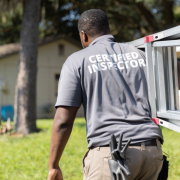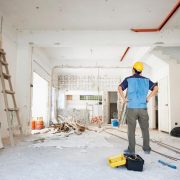
From Potential to Perfection: What to Know Before Buying a Fixer Upper
From Potential to Perfection:
What to Know Before Buying a Fixer Upper
Buying a fixer-upper can be an exciting yet challenging endeavor. Many people are drawn to the idea of purchasing a home that needs some work, either for the potential financial gain or the satisfaction of transforming a space into something uniquely their own. However, before diving headfirst into a renovation project, it’s crucial to understand what you’re getting into. This guide will cover all the essential things you need to know before purchasing a fixer-upper to ensure you’re prepared for both the challenges and rewards that come with such a project.
 What Exactly Is a Fixer Upper?
What Exactly Is a Fixer Upper?
A fixer-upper is a property that is typically sold at a lower price because it requires significant repairs or renovations. These homes range from those needing cosmetic updates, such as fresh paint and new flooring, to those requiring more extensive structural work, such as a new roof, updated plumbing, or a rewiring of the electrical system. The appeal of a fixer-upper often lies in the ability to purchase a home in a desirable area for a lower cost, with the intention of adding value through renovations. For many, it’s a way to gain equity and personalize a home in ways that wouldn’t be possible with a move-in-ready property. However, a fixer-upper can quickly turn into a financial burden if the buyer doesn’t fully understand the extent of repairs required. That’s why it’s crucial to do thorough research and prepare for the challenges ahead. Knowing whether you’re tackling minor fixes or major overhauls can save you from a host of unexpected problems.
 Research the Neighborhood
Research the Neighborhood
Even the perfect fixer-upper won’t be a good investment if it’s located in the wrong neighborhood. Before purchasing, research the area to ensure it’s a place where you’ll want to live or where future buyers will be interested. Consider factors such as proximity to schools, parks, public transportation, and shopping centers. It’s also worth looking at trends in the neighborhood. Are other homes being renovated? Are property values rising? These indicators can suggest whether your investment will pay off in the long term. If the neighborhood is declining or has little demand, it might be harder to recoup your investment even after extensive renovations.
Financial Considerations
One of the first and most important steps in buying a fixer-upper is assessing your financial situation. While the initial purchase price of a fixer-upper might be attractive, the true cost lies in the renovations. You’ll need to carefully calculate whether the total cost—purchase price plus renovation expenses—will ultimately make financial sense, especially if you plan to sell the property later. Traditional mortgages might not cover renovation costs, so you may need to explore other financing options. A popular choice is the 203(k) loan, which bundles both the purchase price and renovation costs into a single mortgage. Other options include home equity loans or personal loans, but each of these will have different interest rates, repayment terms, and eligibility requirements.
It’s also important to build a buffer into your budget. Renovations, especially in older homes, often come with hidden surprises. Problems like outdated plumbing, electrical systems, or structural damage might not become apparent until work has started. Adding a contingency fund—typically 15-20% of the renovation budget—will help ensure that you’re prepared for unexpected costs.
Get a Thorough Home Inspection

Before purchasing a fixer-upper, investing in a comprehensive home inspection is essential. A professional home inspection will uncover any hidden issues that might not be obvious during a casual walk-through. The goal of the inspection is to identify both minor and major problems that could significantly impact your renovation plans. Common areas of concern in fixer-uppers include structural issues like cracks in the foundation or sagging floors, outdated electrical wiring, plumbing issues, and potential water damage. Roofing problems or insulation deficiencies may also come up, especially in older homes. One major issue often overlooked is pest damage, which could mean termites or other insects have compromised the structural integrity of the property. A thorough inspection gives you a clear understanding of the repairs needed and helps you make an informed decision on whether the property is worth investing in
Scope of Renovations: Cosmetic vs. Structural
When purchasing a fixer-upper, it’s essential to differentiate between cosmetic and structural renovations. Cosmetic renovations include projects like painting, refinishing floors, and updating kitchen countertops or cabinets. These are typically less expensive and can make a significant difference in the home’s appearance without requiring extensive work. On the other hand, structural renovations involve changes to the foundation, roofing, plumbing, or electrical systems. These types of renovations are more complex, often requiring professional contractors and permits. They can also be much more expensive. For example, replacing an entire roof or installing new electrical wiring can cost thousands of dollars and may take longer to complete. Understanding the scope of the work involved will help you set realistic expectations for both the timeline and budget of your renovation project.
Prioritize Repairs

Once you’ve purchased your fixer-upper, it’s essential to prioritize the renovation projects. Tackling everything at once can be overwhelming and costly. Instead, focus on the most important repairs first. Start with projects that affect safety, such as repairing structural damage, fixing electrical or plumbing issues, and addressing any pest infestations. After ensuring the home is safe and habitable, move on to repairs that prevent further deterioration, like replacing a leaky roof or addressing water damage. Finally, you can turn your attention to cosmetic upgrades that enhance the home’s appearance and value.
Permits, Zoning Laws, and Building Codes
Renovating a fixer-upper also means dealing with local zoning laws, building codes, and permits. Some renovations, particularly those that involve structural changes, electrical work, or additions to the home, require permits. These permits ensure the work is being done safely and in compliance with local regulations. Failing to obtain the proper permits can result in fines or complications when selling the home later on. Additionally, check the zoning laws in your area to make sure any planned renovations, such as adding a second story or converting a garage into living space, are allowed. If you’re unfamiliar with local laws and building codes, it may be worth consulting with a professional who can guide you through the process and ensure that everything is done legally and correctly.
Time, Effort, and Expertise
Renovating a fixer-upper requires a considerable investment of time and effort. If you’re planning to do some of the work yourself, consider whether you have the necessary skills to handle the tasks. While many homeowners can handle basic jobs like painting or installing new fixtures, more technical work, such as electrical or plumbing repairs, should be left to professionals.Even if you’re hiring contractors for major renovations, the process can still be time-consuming. Some fixer-uppers require so much work that it may not be feasible to live in the home during the renovation. This means you’ll need to budget for alternative housing if the home isn’t livable right away. Additionally, renovations often take longer than expected, especially if you run into unforeseen issues.
After-Repair Value
A key concept to understand when purchasing a fixer-upper is the After-Repair Value (ARV). This is the estimated value of the home after all renovations are completed. To determine the ARV, you’ll need to research comparable homes in the area that have been updated and are in good condition. These homes, known as comps, will give you an idea of how much your fixer-upper could be worth once the renovations are finished. Calculating the ARV is crucial if you’re planning to sell the home or refinance after the renovations. You want to ensure that the total cost of purchasing and renovating the home will result in a property that’s worth more than your investment.
Seek Professional Guidance
If this is your first time buying a fixer-upper, it’s advisable to seek professional help. A real estate agent with experience in fixer-uppers can guide you through the purchasing process, while a contractor can provide estimates on renovation costs. Additionally, a professional home inspector will help you assess the condition of the property and identify any major issues before you commit. Purchasing a fixer-upper can be a rewarding experience, offering the opportunity to create a custom home or make a profitable investment. However, it’s crucial to approach the process with a realistic understanding of the financial, time, and effort commitments involved. From securing financing and navigating zoning laws to prioritizing renovations and calculating after-repair value, there’s a lot to consider. With careful planning and the right guidance, you can transform a fixer-upper from a project filled with potential into a home that’s nothing short of perfection. Ready to get started on your fixer-upper journey? Contact us today for a comprehensive inspection to help you uncover the property’s true potential and ensure a successful transformation!



